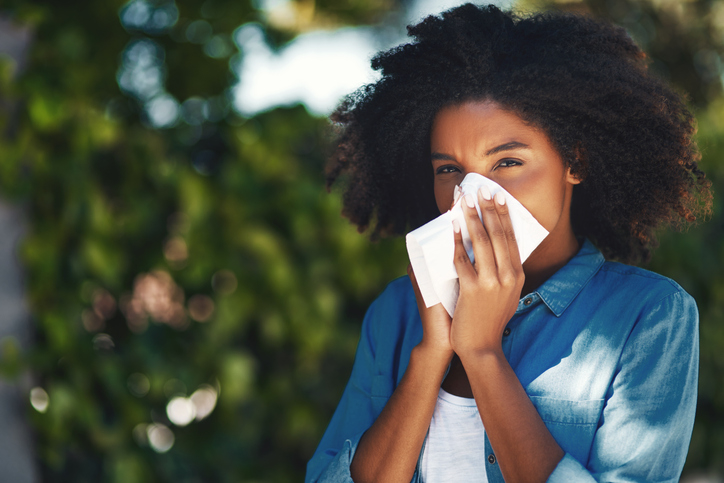Commitment + Clinical Leadership = Better Outcomes

Allergies vs Cold Symptoms: Know the Difference
Many people will experience the same symptoms in the spring and fall – their nose will run, their throat will feel scratchy, and they may have a cough.
However, how do you know if you are experiencing a cold or allergies? Many of the symptoms are similar, yet colds and allergies are often confused because these flare-ups occur at the same time each year.
The Centers for Disease Control and Prevention (CDC) cites that colds are most common during the winter and spring months.1 However, it is important to keep in mind that a cold can occur at any time of the year. Seasonal allergies tend to occur the most in the springtime, from February to early summer.2
Knowing that there is an overlap during the spring season for colds and allergies, you may be curious on whether you’re experiencing a cold or allergies. Here is some information about allergies, colds, and the overlapping symptoms.
The Causes of an Allergy vs Cold
Allergies are generally caused by an immune system response to an allergen. Allergens can include things such as pollens, molds, and dust mites.3 Your symptoms will always be present as long as the allergens are around.
Colds are caused by viruses, and they can last 7 to 10 days. The symptoms will last throughout the duration of the cold.4
Allergies vs Cold Symptoms
Here is a table of allergy vs cold symptoms. Keep in mind that your specific case may have combinations or variations of some of these.
|
Symptom |
Cold |
Allergy |
|
Cough |
Common |
Sometimes |
|
Watery or Itchy Eyes |
Rarely |
Common |
|
Itchy Ears |
Never |
Common |
|
Sneezing |
Common |
Common |
|
Runny or Stuffy Nose |
Common |
Common |
|
Fever |
Sometimes |
Never |
|
Circles Under Eyes |
Never |
Usually |
|
Sore Throat |
Common |
Rarely |
|
Headache |
Common |
Common |
|
Tiredness or Fatigue |
Common |
Common |
|
Aches or Pain |
Common |
Rarely |
|
Chest Discomfort |
Usually |
Rarely |
Some ways to tell if it’s a cold or allergies:
- Length of time. Colds will usually resolve themselves within one to two weeks. Allergies will typically be ongoing throughout the season as long as the allergen is present.
- Mucus color. A cold will typically have thick mucus that can be different colors, such as yellow. Allergies have mucus that will be clear in color.8
- Wet cough. A cold will usually produce a wet cough with phlegm; allergies do not.9
- Itchy or watery eyes. A cold will rarely have itchy or watery eyes. Allergies will usually have itchy or watery eyes caused by allergens.
- Fever. A fever is one method you can use to tell if it's allergies or a cold. A cold will usually bring a fever that will cause your body temperature to rise. Allergies typically do not cause fevers. However, it is possible to have a fever and allergies at the same time.
Treatments for Allergies vs Cold
Allergies
Allergies do not have a cure that will make them completely disappear, but you can take antihistamines, nasal steroid sprays, shots, and decongestants to ease the symptoms. If you are unsure what is the cause of your allergy, you can reach out to a medical professional for an allergy test. They may be able to tell you the cause as well as prescribe you the right treatment.
The symptoms of an allergy can also be reduced if you minimize your exposure to the allergen; for example, if you are allergic to pollen, limiting your exposure to it outside will help reduce your symptoms.
Colds
Colds are often cured over week or two as your body fights off the virus. You can’t fully make the symptoms of a cold disappear, but you can reduce them with rest, decongestants, and over-the-counter medicine.4 It’s also recommended to drink plenty of fluids as well as avoid alcohol and caffeine when you are fighting a cold.
If your cold symptoms do not subside after a week or two, you should contact a medical expert for a professional diagnosis. This is especially important if you develop a sinus infection or signs of another condition, such as pneumonia. An urgent care center or a healthcare provider may be able to diagnose you and let you know if what you have is more than a minor illness.
Saber Healthcare is an organization dedicated to providing consultant services to long term care providers. This article is for informational purposes and is not meant to be seen as professional advice. Please consult with a medical expert before relying on the information provided.
Sources
- https://www.cdc.gov/common-cold/about/
- https://acaai.org/allergies/allergic-conditions/seasonal-allergies/
- https://www.saberhealth.com/news/blog/manage-summer-allergies
- https://www.nhsinform.scot/illnesses-and-conditions/infections-and-poisoning/common-cold#:~:text=In%20adults%20and%20older%20children,around%2010%20to%2014%20days.
- https://www.mayoclinic.org/diseases-conditions/common-cold/expert-answers/common-cold/faq-20057857
- https://www.healthpartners.com/blog/cold-or-allergies/
- https://newsinhealth.nih.gov/2014/10/cold-flu-or-allergy
- https://www.webmd.com/allergies/sinus-nose-tool/allergies-or-cold
- https://www.bannerhealth.com/healthcareblog/better-me/how-to-tell-the-differences-between-allergies-and-colds
